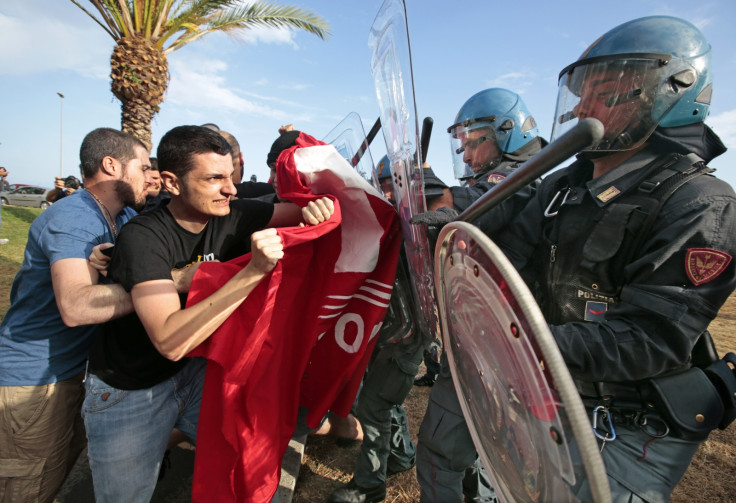Generation Identity: How the European alt-right is planning a British invasion
The group has branches in France, Austria and Germany and could be expanding into the UK.

Back in 2013, a young Austrian activist, Markus Willinger, gave a speech at a conference organised by Traditional Britain, a far-right group, in London. To a chorus of "hear, hears" in plummy British accents, he railed against the European Union before unfurling a black banner emblazoned with a yellow logo.
The flag bore the standard of Generation Identitaire, a right-wing youth group with branches in France, Australia and Germany. In 2013, Willinger published a book, Generation Identity: A Declaration of War Against the '68ers, and his speech in London was supposed to mark the beginning of the movement in Britain.
"We have no power left. Our values don't exist in society. We have no media. We are surrounded by enemies. And if you are surrounded you have only one choice: you must attack. That is exactly what the identitarian movements in Europe do," said Willinger, who could not be reached for comment by IBTimes UK.
"We know that most people are against mass immigration. But they are quiet. The left are not. Whenever they want something they go on the streets. And they have the media. It's time that we are louder than the left."
And then, nothing. Unlike in France and Germany, where Generation Identitaire and its slick media machine are vocal on the anti-immigration right, the movement has been silent in the UK. Its only activity via a YouTube video titled Generation Identity UK: A Declaration of War from the Students of Britain.
In the video, text projected over historical footage of African-Americans states: "We are born with the guilt that they have taken on themselves and all of our race [...]. We are forbidden from knowing the passion and the pride of our ancestors."
Generation identity: The book
Markus Willinger's book Generation Identity came out in 2013 and includes an introduction by French far right activist Philippe Vardon, who is currently heavily involved in Marine Le Pen's campaign for the French presidency.
Later, as pictures of Muslim extremist protesters in London are shown, it adds: "Does not every Englishman today not know a person who has been beaten, raped or robbed by foreigners? To know just one such victim would be fortunate in these times. For a plague is upon us and the body of our nation is rife with rot. This is war."

It is not clear whether the video is an official release from Generation Identitaire, and none of the multiple spokespeople contacted by IBTimes UK responded to repeated requests for comment. But Gerry Gable, founder of UK anti-fascist magazine and research group Searchlight, is convinced that Generation Identitaire is recruiting on at least three British campuses: Durham, London School of Economics and the University of East Anglia.
Gable said that the group keeps a low profile and its members do not associate with traditional far-right groups. They are not skinheads, instead they are trying to build an upper-middle class core of future leaders. "The British movement has been kept very under wraps. But [Generation Identitaire] are going to become much bigger players because of the Trump election," he said.
Just as in the UK, Generation Identitaire is seeking to build a following in the US, and it has its fans – first among them Richard B Spencer, the white nationalist and Donald Trump aficionado, who gave an interview to a French online publication in February 2017 during which he said: "I consider myself an identitarian."
White supremacists are adept at couching their politics in pseudo-intellectual terms ("racial realism" anyone?) but Spencer's reference was an interesting one: the identitarian movement is a growing phenomenon in Europe, not least in France, where many of its activists are involved in the campaign of Marine Le Pen.
According to analysis by the US Southern Poverty Law Centre, the identitarian movement grew out of the far-right and anti-Muslim Bloc Identitaire movement in the early 2000s, which made its name with widely condemned stunts such as distributing soup that contained pork – which is forbidden under Islam – in Muslim neighbourhoods.
Generation Identitaire was the youth wing of Bloc Identitaire but over the past five years has branched out on its own. In 2012, activists occupied a yet-to-be opened mosque in Poitier and unfurled banners reading "732 Generation Identitaire." The number referred to the year in which the Frankish king Charles Martel turned back the invading Muslim Moors near Poitiers. In 2013, they occupied the roof of the French Socialist Party in Paris.
Since then their activity has been largely confined to the Le Pen campaign and the occasional protest, including in August 2016 when activists scaled the Brandenburg Gate in Berlin. In Germany, the movement is known as Identitäre Bewegung (IB). Both branches use the Greek letter lambda on their logo, which was historically used by the Spartans in their war against the invading Persian armies in the fourth century BC.
But aside from their allusions to medieval and ancient history, the Identitarian movement is very much a modern far-right phenomenon. Its activists are not boots-and-braces skinheads throwing bricks through windows but, as dubbed by the Economist, "wolves in skinny jeans".
In recent months key members of the US alt-right have stepped up collaboration with members of the European "identitarian" movement, which has sought to rebrand and detoxify far-right ideology for an educated and young audience. The move is believed to be a push to promote white nationalist ideology across Europe, where far-right parties are winning increasing support.
Inside the alt-right
IBTimes UK has investigated the alt-right white nationalist movement.
World Editor Orlando Crowcroft and reporter Tom Porter profiled the movement's ideological inspirations, including Hindu philosopher and Nazi supporter Savitri Devi and Russian ideologue Alexander Dugin. They investigated the Swedish businessman bankrolling the movement's media empire, reported on attempts by the identitarian movement to recruit on UK campuses, and a new alliance forged between US and European white nationalists.
Reports in the series include:
Putin's Rasputin has a message for Donald Trump's White House: 'Call me'
Meet Daniel Friberg, the Swedish mining tycoon bankrolling the alt-right's global media empire
Inside the alt-right: Stockholm conference brings together US and European white nationalists
Savitri Devi: The strange story of how a Hindu Hitler worshipper became an alt-right icon
© Copyright IBTimes 2025. All rights reserved.






















